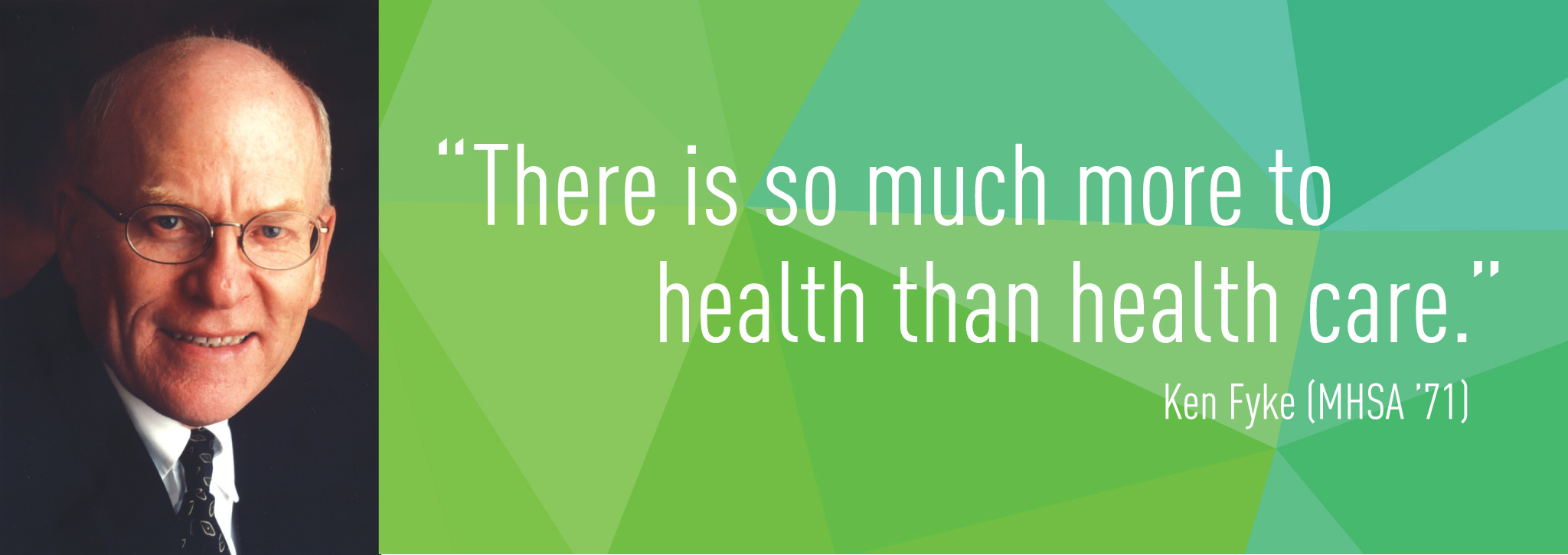
During a career spanning over four decades, Ken Fyke (MHSA '71) has been no stranger to receiving recognition for his significant contributions to his community and his country.
As a former deputy minister of health in two Canadian provinces and someone who has held several senior roles in health care administration, he has provided innovative leadership to many of Canada's health reforms.
The School of Public Health is honoured to bestow another award on Fyke. As someone committed to social justice, equity and health for all people, it is fitting that he is the first recipient of Alumni Anniversary Award.
"Ken has always supported plans and policies that serve the interests of public and patient well-being," says Steven Lewis, colleague and president of Access Consulting Ltd.
According to Peter Glynn, former president and CEO of the Kingston General Hospital, Fyke's leadership was crucial in setting up the Canadian Blood Services following the tainted blood scandal of the 1980s.
"As founding chair of the Board of Directors, Ken set the framework, policies and principles of the rejuvenated voluntary blood system that we enjoy today," says Glynn. "I don't know of anyone else who would have been willing to make the necessary commitment and risk their reputation on such as formidable task."
In the 1990s, Fyke served as a member of the British Columbia Royal Commission on Health Care and Costs. He advocated for bicycle helmet use and was influential in passing legislation requiring cyclists to wear helmets.
While serving as CEO of the Capital Health Region in British Columbia, he transformed the health system by bringing together more than 100 programs, some of which focused on health promotion, public health and secondary prevention-unusual in a system that had traditionally focused on acute care.
Effecting social and political change often presents great challenges. Fyke became adept at building strategic alliances and ensuring the voices of all players-from patient to provider to politician-were heard.
"Everyone's input is important," states Fyke, "and collaboration is essential. I have always tried to listen to all concerned, ask what they think and appreciate their perspective."
Another challenge Fyke acknowledges is that there can often be resistance when implementing change. "But," he says, "that doesn't mean it's wrong to continue to seek these changes."
"As a leader, you need to have the courage to speak truth to power," he explains. "Otherwise, those in power will not understand the implications of the issues or the decisions being made."
Don Juzwishin, adjunct professor in the School, has known and worked with Fyke for more than 30 years and says, "Ken always showed principled behaviour. He did the right thing in the interests of the public's health, even if it appeared unpopular or unconventional."
Fyke is not only known as an outstanding hospital and health system administrator, but he is equally well known as a strong proponent of a preventive population health approach. Juzwishin points out that Fyke has "always sought improvement of the public's health through advocacy, healthy public policy and prudent decision making."
"Health depends on society as a whole," Fyke says. "We need to invest resources on efforts to protect health and prevent disease. Some people think it's all about hospital beds, but it's not. It's about appropriate services."
"There is so much more to health than health care. If you create an environment to prevent illness, you won't have to spend as many resources on acute care. Instead you will enhance the health of the individual, as well as the national health."
The Alumni Anniversary Award was established this year as a legacy initiative to commemorate the 10th anniversary of the School of Public Health. This award recognizes an alumnus(a) for outstanding contributions to the community, the field of public health and to a post-secondary institution.